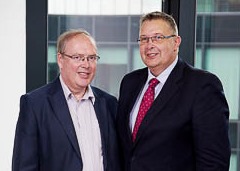First signs of recovery
 The latest PwC Northern Ireland Economic Outlook shows the first signs of recovery since the beginning of the economic crisis. PwC’s Northern Ireland Regional Chairman Paul Terrington talks to Owen McQuade about the prospects for the economy and how we need to develop more outward-looking businesses, including social enterprises.
The latest PwC Northern Ireland Economic Outlook shows the first signs of recovery since the beginning of the economic crisis. PwC’s Northern Ireland Regional Chairman Paul Terrington talks to Owen McQuade about the prospects for the economy and how we need to develop more outward-looking businesses, including social enterprises.
The latest Northern Ireland Economic Outlook from PwC shows the first signs of recovery in the local economy with unemployment and redundancies beginning to fall. The outlook sees the Northern Ireland economy growing by 0.5 per cent for this year. Other economic indicies, in manufacturing, services and construction, are over 50 per cent and back in positive territory for the first time in several years.
“It is an economy that is actually growing and not contracting,” PwC Regional Chairman Paul Terrington emphasises. “From our clients’ point of view, it is an old message but it is true: the companies that are export-orientated, innovative, investing in R&D, are the ones that are doing well.”
PwC recently hosted a dinner for local companies that were finalists in a national business awards competition. Although they were all from quite different sectors, including social enterprises, all were growing and all were outward-looking i.e. innovative, entrepreneurial, confident, good at something quite specific and looking to grow outside Northern Ireland.
He continues: “When you sit in this room and look out over Harland & Wolff, and you think of the things that allowed business to succeed 150 years ago, you see lots of that in local companies such as Wrightbus and Ulster Carpets – a determination to look across the world for opportunities, in specific areas, doing what they are good at.”
Terrington emphases the importance of social enterprises in the local economy and sees them having an increasingly important role in delivering better public services and in becoming an engine to grow the local economy. “It is interesting that we now call them social enterprises as opposed to voluntary and community groups,” he notes. “The social enterprise business model is attractive to government in that they build very strong partnerships with private sector organisations with profits going back into the community and reinvestment.”
However, for many people in Northern Ireland things are still difficult. PwC also looked at hourly wages in Northern Ireland over the past decade. “When adjusted for inflation, the average hourly wage is only 2 pence per hour higher than it was in 2003. This is because of a combination of deflation in wages and a shift from full-time to part-time employment,” Terrington says.
 Adding to household pressures, a recent housing report by the firm found that 70 per cent of Housing Executive and housing association tenants were on housing benefit, with 50 per cent of all those in the private rented sector also on housing and other benefits. “This is staggeringly high compared to other UK regions,” he says. The finding was echoed in a survey by the Money Advice Centre which found that 66 per cent of people in Northern Ireland were in financial distress compared to a UK average of 52 per cent.
Adding to household pressures, a recent housing report by the firm found that 70 per cent of Housing Executive and housing association tenants were on housing benefit, with 50 per cent of all those in the private rented sector also on housing and other benefits. “This is staggeringly high compared to other UK regions,” he says. The finding was echoed in a survey by the Money Advice Centre which found that 66 per cent of people in Northern Ireland were in financial distress compared to a UK average of 52 per cent.
The ‘new normal’
PwC’s national economic adviser (and ex-Monetary Policy Committee member) Andrew Sentance has defined what he calls the ‘new normal’ economy. Six years ago, everyone was saying 2 per cent growth was not good enough and the reality now is that the UK getting to
2 per cent is seen as ‘doing well’. Terrington reflects: “Now we and the business media are even excited about the prospect of the UK possibly getting to 2 per cent growth. For Northern Ireland, we should grow by 0.5 per cent this year and if the recovery continues, we should move that to 1.5 per cent in 2014 – and everyone would be pleased with that.”
One bright spot in the Northern Ireland economy which Terrington highlights is foreign direct investment (FDI) with a 41 per cent increase in FDI for 2012-2013: “Although there is generally a lag between jobs promoted and those created, which may be a feature of investment plans not materialising as might have otherwise, that doesn’t diminish an excellent performance with 2,800 FDI jobs.” This is also well ahead of the UK average of an 11 per cent increase and reflects well on the efforts of Invest NI.
“At last year’s Northern Ireland Economic Conference,” he continues, “I was struck by what the Minister from the Irish Republic said about how many jobs were spun out of inward investment. It was interesting to see how many people supplied services into the FDI companies or got skilled up and then left to set up their own businesses, with these growing in turn. Although FDI companies still dominate the technology sector in the Republic, there are now as many people employed in spin-offs as in the FDI company sector.”
As one of the region’s largest employers and exporters, PwC sees pressures on that part of the labour market – high-end graduates and technology specialists. “Each year, we hire over 150 graduates and the competition is ever more intense,” he remarks. “It is still, relative to other UK regions, a good place to attract quality graduates which is one of the reasons we are able to build centres of excellence in Northern Ireland to service PwC clients worldwide.”
Banking
Another issue for local business is banking. During the boom, 90 per cent of loan applications were successful. “That figure is still relatively high at 66 per cent but, when you look behind that, a mere 8 per cent of businesses went to their banks looking for finance,” Terrington notes. “That is worrying because once the recovery comes through, neither party is going to be used to dealing with each other. The factors that discourage potential borrowers include the need to service existing property debt, the increased cost of finance, and higher fees and more burdensome processes and procedures in the loan application process.”
In his view, the application rates for loans are perhaps low because only 15 per cent of micro-businesses, which make up the bulk of the private sector in Northern Ireland, describe themselves as ‘growing’ and more than 40 per cent are operating in ‘reducing, survival or winding down’ modes. Medium-sized businesses are faring better with 35 per cent ‘growing’ and 25 per cent in ‘reducing/survival’ mode.
PwC has also highlighted what the firm perceives as the growing problem of lending skills, an issue reflected in its Business Banking Tracker survey. Terrington warns: “With the previous focus on property lending and the subsequent reduction in staff, the banks now don’t have staff with wider sectoral expertise and experience in evaluating investment plans and in risk management; unless we fix that, it will become a problem when the economy does pick up.”
Devolution
A question Terrington asks is: “Are we maximising devolution for our own benefit?” He worries that although Northern Ireland was the first of the devolved nations to seek fiscal devolution, it may end up as the only region with no unique fiscal flexibility.
“In talking to colleagues in Scotland, there is an air of confidence about government in Scotland,” he points out. “The Scottish Government is committed to 15 pieces of legislation for the coming year. In Wales, their Assembly is growing in confidence in their own ability. Constitutionally, as well as economically, both jurisdictions are looking to take on more and more responsibility and the taxation piece has a wider role than just economics – it is about defining who they are.”
Terrington’s colleagues in Scotland say that it is not simply about politics but about what is good for business in Scotland. “It will also be interesting to see how the Heseltine report plays out in the English regions and how the Birmingham pilot will work through the system, with the prospect of significant devolution for the English regions,” he remarks.
Turing his attention back to Northern Ireland, Terrington sees new Finance Minister (and PwC alumnus) Simon Hamilton’s comments on how he wants to change the model of government to mirror this ‘new normal’ as particularly interesting.
There is a sense of not reducing public spending as such but to make it efficient and part of a growing economy. The new Minister is also keen to introduce specific performance targets for government, to develop a performance-related economy with modern public services.
On corporation tax, Terrington says that it is not really a question of choice between corporation tax and a ‘plan B’.
“There is a problem with the language around this issue as some are saying that corporation tax is shelved, so we now need an alternative,” he affirms. “We have always said that measures such as R&D incentives, taxing products with eligible patents at 10 per cent (the so-called ‘patent box’), were always needed alongside any devolution of corporation tax rates.
“Tax breaks and fiscal incentives have always been worth pursuing. There may even be a greater need now as the other devolved nations are moving ahead with their own plans – but it was never a matter of either/or.”
Profile: Paul Terrington
Paul Terrington is Regional Chairman of PwC in Northern Ireland having previously headed its advisory practice. He managed PwC’s rapid expansion into export markets through its Belfast-based centres of excellence while sustaining growth in the domestic market, making PwC one of the region’s largest employers. He sits on PwC’s national Consulting Leadership Team and is Chairman of the Institute of Directors’ Northern Ireland Division.
Profile: Andrew Sentance
Dr Andrew Sentance CBE is Senior Economic Adviser to PwC and will give a keynote presentation at this year’s Northern Ireland Economic Conference on how the devolution of fiscal powers can drive economies. Andrew joined the firm in November 2011 after serving as an external member of the Monetary Policy Committee of the Bank of England from October 2006 until May 2011. Immediately before joining the Bank of England, Andrew was Chief Economist at British Airways.
After studying at Cambridge and the LSE, Andrew started his career as a business economist at the Confederation of British Industry, moving to the London Business School in 1994 and on to BA in 1998. While at the CBI, he was a founder member of the Treasury’s Panel of Independent Forecasters – also known as the ‘seven wise men’.
He is also a part-time professor at Warwick Business School, a visiting professor at Royal Holloway, London, and Vice-President of the Society of Business Economists.





